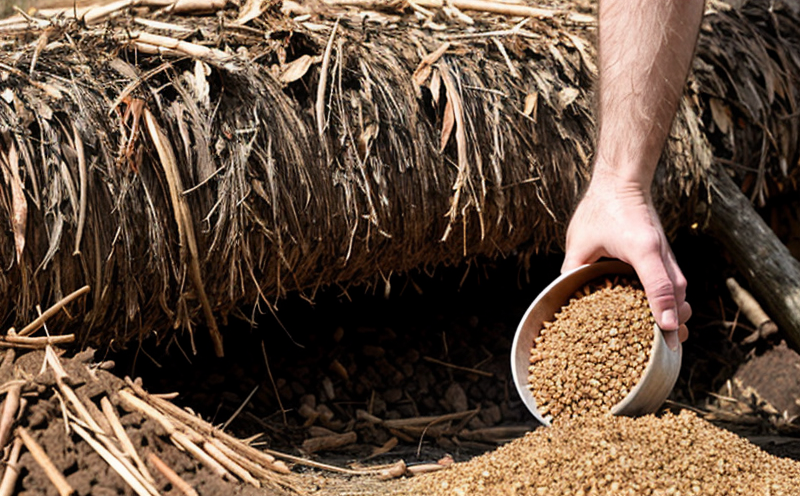
-
Renewable Energy Testing and Standards-
Biomass Energy Testing and Standards-
Biomass Feedstock Certification
We provide comprehensive solutions designed to help our clients mitigate risks, enhance performance, and excel in key areas such as quality, health & safety, environmental sustainability, and social responsibility.
Discover
For many years, our organization has been operating successfully, boasting modern laboratories that meet international standards. These laboratories are equipped with the latest technology devices and equipment, and we have built a strong team of experienced and trained personnel to operate them.
DiscoverWelcome to Eurolab, your partner in pioneering solutions that encompass every facet of life. We are committed to delivering comprehensive Assurance, Testing, Inspection, and Certification services, empowering our global clientele with the ultimate confidence in their products and processes.
Discover
-
Renewable Energy Testing and Standards-
Biomass Energy Testing and Standards-
Biomass Feedstock CertificationBiomass Feedstock Certification: A Crucial Step towards Sustainable Energy Production
The increasing demand for renewable energy sources has led to a surge in biomass production worldwide. Biomass feedstocks are organic materials such as wood chips, agricultural waste, and municipal solid waste that can be converted into various forms of energy like electricity, heat, and transportation fuels. However, the quality and sustainability of these feedstocks have raised concerns among consumers and regulators alike. This is where biomass feedstock certification comes in a crucial step towards ensuring the environmental integrity and quality of biomass-based energy production.
What is Biomass Feedstock Certification?
Biomass feedstock certification is a process that verifies the origin, quantity, and quality of biomass feedstocks. It ensures that these materials are sourced sustainably, harvested responsibly, and processed efficiently to minimize waste and emissions. The certification process typically involves third-party auditors who inspect and evaluate the production chain, from harvesting to processing, to ensure compliance with established standards.
Benefits of Biomass Feedstock Certification
Ensures sustainability: By verifying the origin and sourcing of biomass feedstocks, certification ensures that forests are not over-harvested, and agricultural land is not degraded. This helps maintain ecosystem balance and preserves biodiversity.
Improves quality: Certification processes monitor the processing and storage conditions to prevent contamination, degradation, or spoilage. This results in higher-quality feedstocks, which in turn produce cleaner energy and reduce waste.
Enhances market access: Biomass feedstock certification provides a guarantee of sustainability and quality, making it easier for producers to sell their products on the global market. This increases market competitiveness and revenue opportunities for producers.
Key Aspects of Biomass Feedstock Certification

Pharmaceutical Compliance
Pharmaceutical compliance refers to the adherence of pharmaceutical companies and organizations to l...

Cosmetic Product Testing
The Complex World of Cosmetic Product Testing The cosmetics industry is a multi-billion-dollar ma...

Environmental Simulation Testing
Environmental Simulation Testing: A Comprehensive Guide In todays world, where technology is rapidl...

Hospitality and Tourism Certification
Hospitality and Tourism Certification: Unlocking Opportunities in the Industry The hospitality and ...

Electromechanical Safety Certification
Electromechanical Safety Certification: Ensuring Compliance and Protecting Lives In todays intercon...

IT and Data Center Certification
IT and Data Center Certification: Understanding the Importance and Benefits The field of Informatio...

Aviation and Aerospace Testing
Aviation and Aerospace Testing: Ensuring Safety and Efficiency The aviation and aerospace industr...

Trade and Government Regulations
Trade and government regulations play a vital role in shaping the global economy. These regulations ...

Transportation and Logistics Certification
Transportation and Logistics Certification: A Comprehensive Guide The transportation and logistics ...

Chemical Safety and Certification
Chemical safety and certification are critical in ensuring the safe management of products and proce...

Battery Testing and Safety
Battery Testing and Safety: A Comprehensive Guide As technology continues to advance, battery-power...

Agricultural Equipment Certification
Agricultural equipment certification is a process that ensures agricultural machinery meets specific...

Fire Safety and Prevention Standards
Fire Safety and Prevention Standards: Protecting Lives and Property Fire safety and prevention stan...

Environmental Impact Assessment
Environmental Impact Assessment: A Comprehensive Guide Environmental Impact Assessment (EIA) is a c...

NEBS and Telecommunication Standards
Network Equipment Building System (NEBS) and Telecommunication Standards The Network Equipment Bu...

Healthcare and Medical Devices
The Evolution of Healthcare and Medical Devices: Trends, Innovations, and Challenges The healthcare...

Consumer Product Safety
Consumer Product Safety: Protecting Consumers from Harmful Products As a consumer, you have the rig...

Pressure Vessels and Installations Testing
Pressure Vessels and Installations Testing Pressure vessels are a critical component of various ind...

Renewable Energy Testing and Standards
Renewable Energy Testing and Standards: Ensuring a Sustainable Future The world is rapidly transiti...

Energy and Sustainability Standards
In today’s rapidly evolving world, businesses face increasing pressure to meet global energy a...

Automotive Compliance and Certification
Automotive Compliance and Certification: Ensuring Safety and Efficiency The automotive industry is ...

Lighting and Optical Device Testing
Lighting and Optical Device Testing: Ensuring Performance and Safety Lighting and optical devices a...

MDR Testing and Compliance
MDR Testing and Compliance: A Comprehensive Guide The Medical Device Regulation (MDR) is a comprehe...

Electrical and Electromagnetic Testing
Electrical and Electromagnetic Testing: A Comprehensive Guide Introduction Electrical and electrom...

Construction and Engineering Compliance
Construction and Engineering Compliance: Ensuring Safety, Quality, and Regulatory Adherence In the ...

Military Equipment Standards
Military Equipment Standards: Ensuring Effectiveness and Safety The use of military equipment is a ...

Railway Industry Compliance
Railway Industry Compliance: Ensuring Safety and Efficiency The railway industry is a critical comp...

Product and Retail Standards
Product and Retail Standards: Ensuring Quality and Safety for Consumers In todays competitive marke...

Industrial Equipment Certification
Industrial equipment certification is a critical process that ensures industrial equipment meets spe...

Food Safety and Testing
Food Safety and Testing: Ensuring the Quality of Our Food As consumers, we expect our food to be sa...